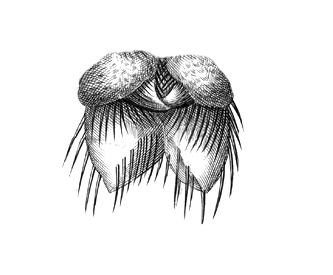
Louse-drawing remains static, lying on its back, and dictates its divides - no leg has been maliciously sawn in half. I worried initially about having to succumb to prescribed pictorial sections in mapping the writings - if this was a reduction - but have come to see it as a necessary step in presenting the texts as transparent information. Louse still functions as figure, perhaps more so, in this cartographic state. Though there are size differences in louse-drawing (the abdomen is bigger than each leg), this is not to be thought of as a utilised hierarchy. The option remains there, too, for irrational divides, not following any such cartographic lines, all the way down to the size of a clickable pixel. Still, I find some unity in tracing ongoingness using the lines with which Hooke constructed louse-drawing, via the microscope, some 350 years ago.
List of Illustrations
The main homepage uses Robert Hooke’s drawing of a louse from Micrographia, 1665. All individual sections are headed by a dissected body part of this same drawing.
The images in the margins are dissected legs from Robert Hooke’s drawing of an ant, also from Micrographia, 1665.
The other images included amongst the text are as follows:
fig.1 - Robert Hooke's microscope in Micrographia, 1665. Situated in hair
fig.2 - Great Vowel Shift diagram/caravan, Arieh Frosh, 2019. Situated in leg 2
fig.3 - Counterpart words map of the body louse. Source: World Loanword Database (accessed 17 June 2019). Situated in leg 4
fig.4 - a whole lot slower (Kibble Balance), Arieh Frosh, 2019. Originally published in Le Grand K, Royal College of Art, 2019. Situated in bulbs
fig.5 - Cemetery of Splendour (still), dir: Apichatpong Weerasethakul, 2015. Situated in abdomen
With great thanks to Jonathan P Watts, and to Sonia Bernac and Bruno for their skilfull work on the website.
Bibliography
Barad, Karen. ‘TransMaterialities’ in GLQ: A Journal of Lesbian and Gay Studies, North Carolina: Duke University Press, 2015
Barthes, Roland. S/Z. Oxford: Blackwell, 1990
Barthes, Roland. The Pleasure of the Text. New York: Hill and Wang, 1975
Bierce, Ambrose. The Devil’s Dictionary. Cleveland and New York: The World Publishing Company, 1911
Bogost, Ian. Alien Phenomenology, or, What it's Like to Be a Thing. Minneapolis: University of Minnesota Press, 2012
Braidotti, Rosi. Transpositions. Cambridge, UK and Malden, Massachusetts: Polity Press, 2006
Butler, Judith. ‘Against Ethical Violence’ in Giving an Account of Oneself. New York: Fordham University Press, 2005, pp. 41-82
Caillois, Roger. ‘Mimicry and Legendary Psychasthenia’ in The Edge of Surrealism: A Roger Caillois Reader edited by Claudine Frank. Durham and London: Duke University Press, 2003, pp. 91-103
Carson, Anne, and Lanfranco Quadrio. Nay rather. Lewes: Sylph, 2014
Cavendish, Margaret. The Description of a New World, Called The Blazing-World. 1666
Celan, Paul. Selected Poems, with translation by Hamburger, Michael. England: Penguin Books, 1996
De Landa, Manuel. A Thousand Years of Nonlinear History. New York: Swerve Editions, 1997
Deleuze, Gilles. Spinoza: Practical Philosophy. San Francisco: City Lights Books, 1988
Deleuze, Gilles, and Félix Guattari. Kafka: Toward a Minor Literature. Minneapolis, Minn: University of Minnesota Press, 2008
Deleuze, Gilles and Claire Parnet, Dialogues. Paris: Flammerion, Collection Dialogues, 1977
Glissant, Édouard. ‘For Opacity’ in Poetics of Relation. Ann Arbor: The University of Michigan Press, 2010, pp. 189 -194
Haraway, Donna J. Staying with the Trouble: Making Kin in the Chthulucene. Durham; London: Duke University Press, 2016
Haraway, Donna. ‘Tentacular Thinking: Anthropocene, Capitalocene, Chthulucene’ in e-flux journal #75, September 2016
Haraway, Donna ‘The Promises of Monsters: A Regenerative Politics for Inappropriate/d Others’ in Cultural Studies, edited by Lawrence Grossberg, Cary Nelson, and Paula A. Treichler. New York: Routledge, 1992, pp. 295-337
Haraway, Donna & Kenney, Martha, ‘Anthropocene, Capitalocene, Chthulhucene’ in Art in the Anthropocene, edited by Heather Davis & Etienne Turpin. London: Open Humanities Press, 2015, p.255 – 270
Haspelmath, Martin and Uri Tadmor (eds.) Loanwords in the World’s Languages: A Comparative Handbook. Berlin and New York: Mouton de Gruyter, 2009
Herman, David (ed.) The Cambridge Companion to Narrative. Cambridge: Cambridge University Press, 2011
Hooke, Robert. Micrographia. London: Royal Society, 1666
Hughes, Ted. Crow. London: Faber and Faber Ltd. 1995
J.C.Grierson, Herbert (ed.), Donne: Poetical Works. Oxford University Press, 1971
Lord, Beth. Spinoza’s Ethics. Edinburgh University Press, 2010
Loyko, Dasha; Károly Tendl and Andrea Khôra (eds.) Le Grand K. Royal College of Art, 2019
Markson, David. Wittgenstein’s Mistress. Dalkey Archive Press, 2015
Michaux, Henri. A Certain Plume. New York: New York Review of Books, 2018
Riley, Denise. Impersonal Passion. Durham : Duke University Press, 2005
Rovelli, Carlo. The Order of Time. London: Penguin books, 2017
Saunders, George. Lincoln in the Bardo. Bloomsbury, 2017
Sharpe, Christina. In the Wake. Durham and London: Duke University Press, 2016
Vishmidt, Marina. ‘Management and Maintenance’ in Look at Hazards, Look at Losses, edited by Anthony Iles, Danny Hayward, and Marina Vishmidt. Mute, 2017, pp. 12-28
Woolf, Virginia. Orlando. Granada Publishing Limited, 1980
Zdebik, Jakub. Deleuze and the Diagram: Aesthetic Threads in Visual Organization. London: Bloomsbury Academic, 2012
Zeno, Vendler. ‘Vicarious Experience’ in Revue de Métaphysique et de Morale, 84e Année, No. 2 pp. 161-173: Presses Universitaires de France, 1979
Zinsser, Hans. Rats, Lice, and History. London: George Routledge & Sons, 1935
Non print
Cemetery of Splendour, dir: Apichatpong Weerasethakul, 2015
https://backdoorbroadcasting.net/2018/07/judith-butler-and-lisa-baraitser-enduring-and-broken-time/ (Accessed 16th June 2019)
https://backdoorbroadcasting.net/2018/11/rae-langton-empathy-and-first-personal-imagining/ (Accessed 16th June 2019)
https://www.bl.uk/shakespeare/articles/a-close-reading-of-the-flea (Accessed 16th June 2019)
https://www.camden.gov.uk/documents/20142/1458280/River+Fleet.pdf/0f0063cc-7079-32c2-5822-6306dcd56d62 (Accessed 16th June 2019)
https://code.fb.com/ml-applications/deal-or-no-deal-training-ai-bots-to-negotiate/ (Accessed 16th June 2019)
https://ebooks.adelaide.edu.au/c/cavendish/margaret/blazing_world/chapter1.html (Accessed 16th June 2019)
https://www.economist.com/science-and-technology/2018/11/17/the-kilogram-and-three-other-metric-units-are-about-to-be-revamped (Accessed 16th June 2019)
https://en.wikipedia.org/wiki/Baruch_Spinoza (Accessed 16th June 2019)
https://en.wikipedia.org/wiki/Ecological_resilience (Accessed 16th June 2019)
https://gizmodo.com/no-facebook-did-not-panic-and-shut-down-an-ai-program-1797414922 (Accessed 16th June 2019)
https://glottolog.org/?fbclid=IwAR3NOMo2A1K-lyfirSgel8xA60OA1mjG4P20P6VjVsrdfqaRiO7ETQU6Up4 (Accessed 16th June 2019)
https://play.google.com/books/reader?id=qNBTLOTyhT8C&hl=en_GB&pg=GBS.PA210-IA3 (Accessed 16th June 2019)
https://www.poetryfoundation.org/poems/46467/the-flea (Accessed 16th June 2019)
https://www.poetryfoundation.org/poems/47413/louse-hunting (Accessed 16th June 2019)
https://www.poetryfoundation.org/poems/48860/the-raven (Accessed 16th June 2019)
http://www.secret-satire-society.org/wp-content/uploads/2014/01/Ambrose-Bierce-The-Devils-Dictionary.pdf (Accessed 16th June 2019)
https://www.theguardian.com/football/2018/dec/09/raheem-sterling-newspapers-fuelling-racism-alleged-abuse-chelsea (Accessed 16th June 2019)
https://www.theguardian.com/science/the-h-word/2013/aug/07/radio-seven-ages-science-history (Accessed 16th June 2019)
http://udel.edu/~pcole/fieldmethods2010/The%20Leipzig-Jakarta%20Word%20List.pdf (Accessed 16th June 2019)
https://wold.clld.org (Accessed 16th June 2019)
https://www.youtube.com/watch?v=JsGPwjEIeio&feature=youtu.be (Accessed 16th June 2019)
https://youtu.be/zyhZ8NQOZeo?t=216 (Accessed 16th June 2019)
http://www.zachblas.info/writings/informatic-opacity-2/ (Accessed 16th June 2019)
*louse*